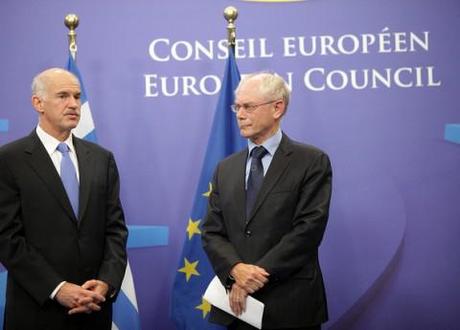
Hermany van Rompuy, President of the EU (right) Photocredit: Πρωθυπουργός της Ελλάδας http://www.flickr.com/photos/primeministergr/5855763059/sizes/z/in/photostream/
Tomorrow, at an emergency meeting in Brussels, Eurozone leaders will discuss the possibility of a second bailout for Greece to aid its debt problems. Previously confined to the smaller European countries (Greece, Ireland and Portugal) the crisis is now tainting the larger economies of Italy and Spain. Germany, the powerhouse of the European Union, must do what it can. Does this spell the end of the European Single Currency, and what are the consequences if so? “Our agenda will be the financial stability of the euro area as a whole and the future financing of the Greek program,” European President Herman Van Rompuy said.
- Sour Krauts? Everything lies in Germany’s hands, said Jeremy Warner in The Daily Telegraph. “The future of the euro is now in jeopardy.” If the euro collapses, “we seem to be staring the biggest economic calamity since the 1930s in the face.” Two solutions will be presented: “One is to bolster the bailout fund, possibly by doubling or even tripling its size to 1.5 trillion euros, so as to cope with Italian and Spanish sovereign debt funding alongside the existing programmes for Greece, Ireland and Portugal. A neater solution … would be to go the whole hog and create a euro bond which would allow individual countries to raise money through debt instruments underwritten by the single currency area as a whole.”
- No more fudging or we’re all doomed. But, continued Warner, while “these remedies might resolve the immediate crisis,” they are flawed. “By giving highly indebted nations carte blanche to borrow on the creditworthiness of the German core, they risk creating an even bigger crisis of indebtedness in the future.” Angela Merkel, the German Chancellor, “doesn’t know if she’s coming or going.” While wanting to maintain the euro, “she reflects the popular mood in refusing to pay for it. She must also answer to a new generation of Germans who see their future not in further European integration,” but in Asia. Other “solutions have to be sought.” Either Germany creates an independent currency, or “those nations that cannot live within German disciplines” simply leave the currency. “If properly managed, this need not be the catastrophe the doomsters suggest. Yet if the solution is to be further fudge and prevarication, then we must truly fear for the future, for the eventual denouement will be very much worse. Do Europeans yet fully grasp these choices? It’s not clear they do.”
- European Union does bring benefits. Hamish McRae in The Independent said that “sovereign defaults do not of themselves mean a country leaving the eurozone.” It might happen, but it’s “some way off.” As for “the future of the euro itself”, well, a “currency zone does not disintegrate just because one member leaves it.” There “is a worst-case scenario, where Greece leaving the eurozone would lead to other countries being forced to do so.” In that case, “the euro would presumably become a Northern European currency, anchored by Germany.” So the euro “would have ‘failed’ in Angela Merkel’s terms; but would that mean the end of Europe?” Probably not: “There is still value in European economic cooperation. Membership of the EU brings more pluses to its members than minuses.” Just look at the UK: were it “to remain a member of the EU (and on the reasonable assumption we don’t join the euro in the meantime) that would demonstrate that it is perfectly possible to run an effective union with two major currencies and a number of smaller ones. So Europe won’t ‘fail’ as such; it would not have moved to an ever-closer union as some politicians wish. But it would survive in perfectly good shape.”
- Cooperation is needed – there are global implications. “Issue European bonds,” said Joseph Stiglitz in The International Herald Tribune, “and pass the low interest rates onto the countries in need, combined with a growth strategy that will engender needed revenues.” There’s a lot at stake: “both for the global economy and for global peace and security.” There may not be “a double dip, but we can be fairly sure that, at best, the likelihood of a long Japanese-style malaise will rise markedly.” Europe needs to lead the way with the recently liberated Arab countries; but “if Europe cannot show sufficient solidarity in helping” them, “then the European model will become totally discredited. Without Europe setting a good economic example, the path to a peaceful Arab Spring transition will be much more difficult.” Globalisation has made us interdependent: “The trouble in the European economy will not only hurt the chances of a successful Arab Spring, it will exacerbate migration pressures that will in turn put more pressure on Europe. Saving the euro — coming to the assistance of the countries of the Continent’s periphery — is not just a matter of charity or solidarity. It is also a matter of self-interest.”
More on the Eurozone Crisis
- Bank stress tests
- Eurozone wobbles
- UK needs to get positive

